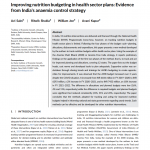
A Crisis of Conscience: Civil Servants & Freedom of Expression
20 September 2022
Last month, on the 75th anniversary of Independence Day, several convicts serving a life sentence were released from jail in an act of clemency. They were convicted of committing gangrape and murder, including that of an infant. The release of these convicts was greeted by horror and revulsion across the country. A young civil servant, as horrified by this act of the government as any right-thinking citizen, expressed her consternation at this release and her solidarity with the victim of this heinous crime.
Her action was greeted by angry retorts by supporters of the ruling party, who trolled her on social media, and reminded her that as a civil servant, she had no business to criticise the action of the government.
Nearly three decades back, when I had just begun my service with the government, when the then government sent in troops to flush out terrorists from the Golden Temple, which resulted in the loss of life of Armed forces personnel and severe damage to historical structures within the precincts of this place of worship, an officer serving in the government was so incensed that he joined protest marches and gave statements criticising the government’s action.
In response, the government initiated disciplinary proceedings against him on the grounds that he had violated the conduct rules which enjoined him not to criticise the government’s actions. It took some behind-the-scenes diplomacy to ensure that the government did not persist in its action against the officer. It also helped that the officer had a fine reputation for honesty and integrity.
The question is whether an officer completely loses his or her right to freedom of speech, or of conscience, by joining the government. Like all matters, there is a legal position and a position of common sense. Ideally, the two must align, but in reality, they might not. The legal position is governed by the conduct rules that apply to the officer level concerned. Concerning the extent of the freedom of speech that the officer has, the rules are more or less the same. In the case of the All India Services officers, the rules say the following:
Rule 7. Criticism of Government.—No member of the Service shall, in any radio broadcast or communication over any public media or in any document published anonymously, pseudonymously or in his name or the name of any other person or any communication to the press or any public utterance, make any statement of fact or opinion,—
i. Which has the effect of an adverse criticism of any current or recent policy or action of the Central Government or a State Government; or
ii. Which is capable of embarrassing the relations between the Central Government and any State Government; or
iii. Which is capable of embarrassing the relations between the Central Government and the Government of any Foreign State:
Provided that nothing in this rule shall apply to any statement made or views expressed by a member of the Service in his official capacity and in the due performance of the duties assigned to him.
A connected rule says as follows:
Connection with press or radio—The previous sanction of the Government shall not be required when the member of the service, in the bonafide discharge of his duties or otherwise, publishes a book or contributes to or participates in a public media.
Provided that he shall observe the provisions of rules and at all times make it clear that the views expressed, are of his own and not those of the Government.
The provisions of Rule seven seem to be absolute in a wide sense. It is enough if the criticism by an officer ‘has the effect’ of being adverse, and is ‘capable of’ embarrassing the relations between the Union, the states, and a foreign government. These words give a wide ambit to the government to exercise discretion whilst determining if the officer has violated the rules or otherwise. Clearly, some level of inexplicable subjectivity is likely to happen, particularly when the political situation is polarised.
In such circumstances, it is important for the government to keep itself within the limits of some objectivity, lest it is subject to the criticism that it adopts double standards, whilst judging possible transgressions of the rules by officers. In the past, sadly, such objectivity has been lacking.
There have been instances of senior serving officers writing facetious, sneering, and insulting social media posts and articles in the press attacking the chief minister of states, and not being pulled up for this. We have also seen serving officers making remarks that could be, to the reasonable person, considered communal, but not being proceeded against. Would, in such circumstance, action against an officer for expressing disappointment at the release of criminals convicted of serious crimes be justified?
In the absence of any clear standards in this regard, this incident is likely to reduce the morale of serving officers. The conduct rules may prevent officials from expressing their disquiet, but disquiet itself can be corrosive. That can have an adverse effect on their performance, which any government can hardly afford. Hopefully, this incident serves as the trigger for a wider debate on the rights and duties of civil servants.
T.R. Raghunandan is an Advisor at the Accountability Initiative.
All views expressed reflect the author’s opinion only.
Also Read: A Lesson To Remember For Officer Trainees





